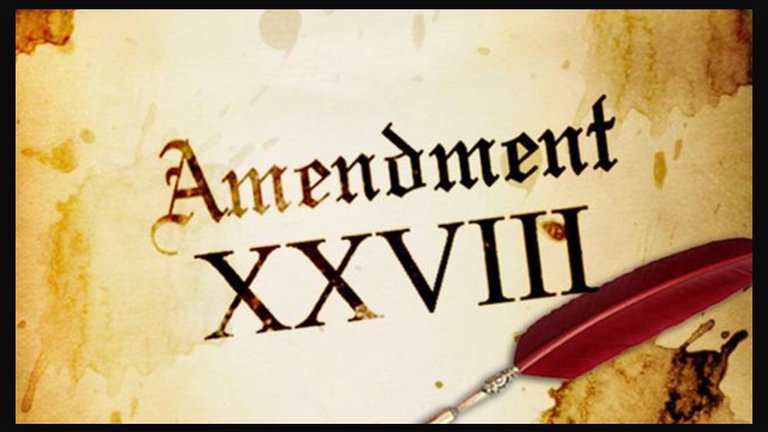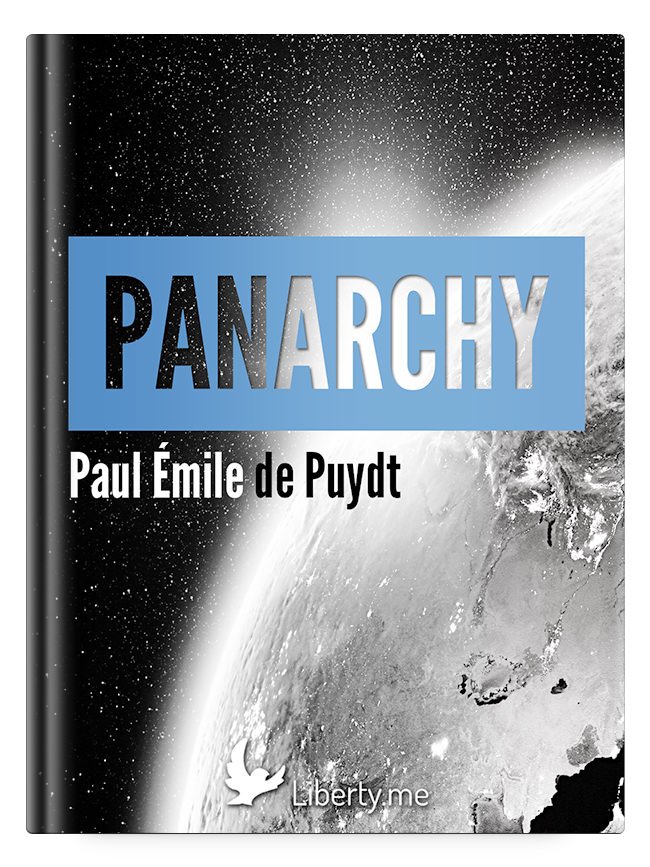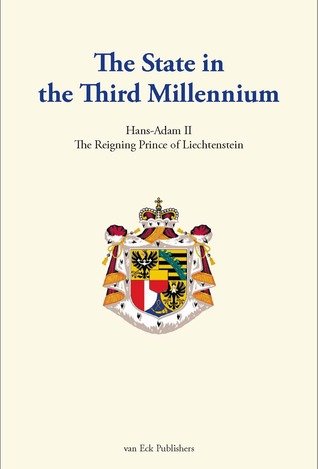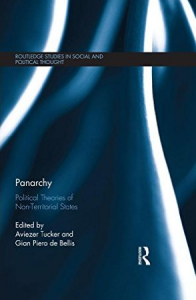
In the year 1860 an obscure Botanist published an article titled, "PANARCHIE," in French in the Revue Trimestrielle in Brussels.
This paper has only recently been rediscovered, but its contents are more and more being recognized as a work of genius.
It describes a political meta-theory that advocates non-terririal states founded on actual rather than hypothetical social contracts that are explicitly negotiated between states and their prospective citizens.
The article describes a form of governance which encompasses all others in that it does not advocate any particular model of the state or social justice, but intends to encourage political variety, innovation, experimentation, and choice.
Freely Choosing Government

The truth is that there is not enough of the right kind of freedom, the fundamental freedom to choose to be free or not to be free, according to one's preference....Thus I demand, for each and every member of human society, freedom of association according to inclination and of activity according to aptitude. In other words, the absolute right to choose the political surroundings in which to live, and to ask for nothing else.
Under the present conditions a government exists only by the exclusion of all the others, and one party can rule only after smashing its opponents; a majority is always harassed by a minority which is impatient to govern. Under such conditions it is quite inevitable that the parties hate each other and live, if not at war, at least in a state of armed peace. Who is surprised to see that minorities intrigue and agitate, and that governments put down by force any aspiration to a different political form which would be similarly exclusive? So society ends up composed of ambitious resentful men, waiting for vengeance, and ambitious power-sated men, sitting complacently on the edge of a precipice. Erroneous principles never bring about just consequences, and coercion never leads to right or truth.
Then imagine that all compulsion ceases; that every adult citizen is, and remains, free to select from among the possible offered governments the one which conforms to his will and satisfies his personal needs; free not only on the day following some bloody revolution, but always, everywhere, free to select, but not to force his choice on others. At that point all disorder comes to an end, all fruitless struggle becomes impossible. — Paul-Emile de Puydt
Thanks to the forensic efforts of one or two dedicated men, you can read the full reproduced article here, translated into English: https://www.panarchy.org/depuydt/1860.eng.html
The Exit Option

Hans Adam II, The Reigning Prince of Liechtenstein, has asked what the state should look like in the third millennium, and has reached the conclusion that:
citizens should no longer be viewed as servants of the state, but rather that states should be converted into benevolent service companies which serve the people as their customers.
It would be a major success if in the third millennium, humanity were able to transform all states into service companies that worked for the people on the basis of direct and indirect democracy and the right to self-determination at the local level.
At first blush it may seem counterproductive to turn governments into companies, but that is only until you realize that governments are already sorts of companies, Governance Service Companies, and they are distinguished from other companies only in that they are companies we grant territorial monopolies, and we agree to their terms and conditions tacitly by remaining in a geographical location...
The core idea of the Panarchist political meta-theory is to instead allow people to voluntarily choose from a multitude of non-territorial social contracts that are explicitly agreed to, including conditions for entry and exit.
The lack of the exit option in the current territorial Westphalian Nation-State political system we exist in is arguably the cause of nearly all political and social catastrophe related to governance, as well as the perpetual agitation and conflict between different political parties and ideological preferences.
Panarchy says nothing about the kinds of states or social contracts that may emerge, it merely allows for a process of voluntary entry and exit from social contracts, and theorizes that this will result in an evolutionary progressive process and generate a trend for political improvement.
One Size Does NOT Fit All

Rather than the utopian idea that there is one governance system or social contract that is capable of resolving all political, social, cultural, and value differences, Panarchy realistically acknowledges the reality that it is impossible to reconcile all of these differences under one government.
Panarchy recognizes the inherent differences in subjective valuations between peoples, and does not aspire to be able to resolve them under a single contract.
There are as many needs as different personalities. How could all these be reconciled by a single form of government? Clearly, people would accept it only in varying degrees. Some would be content, some indifferent, some would find faults, some would be openly dissatisfied, some would even conspire against it. Whatever happens, you can count on human nature to ensure that the number satisfied would be smaller than the number of dissenters. However perfect a government might be - be it absolutely perfect - there will always be opponents: the people whose natures are imperfect, to whom all perfection is incomprehensible, even disagreeable.
How can they be reconciled? By not trying to reconcile them at all; by letting each party govern itself, and at its own cost. Even choosing Theocracy if one so wishes. Freedom should extend to the right not to be free, and should include it. - Paul-Emile de Puydt
A Practical Solution

There are already many implementation of this idea in the works and ready to launch.
BitNation is perhaps the most notable of these. It utilizes blockchain technology for decentralized record keeping, along with the internet and smartphone technology to allow people to choose between various Governance Service Providers who offer everything from Passports, Birth and Death certificates, welfare programs, security services, space exploration programs, universal basic healthcare and income programs, fire police and infrastructure programs, and dispute arbitration.
People can freely choose between the multitude of various social contracts based on how much they will pay in exchange for the services they want, and opt to sign this social contract over the others, or even to negotiate better terms, including exit options.
Or they can even create their own government based on their own ideals.
The idea is that by offering better services at cheaper prices, these voluntarily entered governments will be able to outcompete the current Nation-States in the open market.
But they must be allowed to compete!
Currently Nation-States have monopolies over entire geographical areas, and no exit option other than the very socially and financially expensive option of migrating to a different territory.
This can change with a single Constitutional Amendment.
A Proposal for a 28th Amendment
No law shall infringe an arbitration clause in a contract, nor shall original jurisdiction of said arbitrator over any area of civil law of the United States or any unit of government therein specified in said clause be denied. The courts of the United States and of any unit of government therein shall defer to the findings of fact of said arbitrator unless clearly erroneous.
The above simple and straightforward amendment to any Nation-State's Constitution is all that is required to carry out this revolution in governance.
It does not require a violent overthrow, nor even a peaceful dissolution of the federal government via executive order. The Territorial Nation-State can remain a default option for all who wish to keep with tradition and stick with what is familiar.
But the amendment would allow those who choose to voluntarily opt out of the territorial nation-state monopoly they were born into and voluntarily opt into the system they prefer.
This change in governance is not only ethically consistent with voluntarism, but it is consistent with the technological innovations that are more and more making the antiquated territorial nation-state system obsolete.
For more information I encourage you to scour the wealth of information contained at panarchy.org as well as to read the newly published book "Panarchy: Political Theories of Non-Territorial States" by Aviezer Tucker and Gian Piero de Bellis.
- KG

Don't depend on documents to defend your individual liberty. The US Constitution is a joke. The government of the US certainly doesn't follow it at all. An amendment to it wouldn't help either.
The key is whether an agreement is voluntarily entered into by all parties. Can I leave that agreement without violence or theft being used against me in the future too?
"Can I leave that agreement without violence or theft being used against me in the future too?"
Yes, according to the Panarchist metapolitical theory everyone should have the freedom to voluntarily enter and exit any government without having to move to a different geographical location.
To enter a government you would simply sign the explicit social contract and agree to the terms and conditions of the contract. It is conceivable that Governance Service Provider contracts would act someone like the contract you sign with your phone company. There could be 1-Year contracts, 2-Year contracts, and potentially LifeTime contracts with conditions and fees for breaking the contract, but I doubt LifeTime contracts would be very popular.
Either way, as you say, "The key is whether an agreement is voluntarily entered into by all parties."
Congratulations @kierkeguardian! You have completed the following achievement on Steemit and have been rewarded with new badge(s) :
Click on the badge to view your Board of Honor.
If you no longer want to receive notifications, reply to this comment with the word
STOPDo not miss the last post from @steemitboard:
SteemitBoard and the Veterans on Steemit - The First Community Badge.